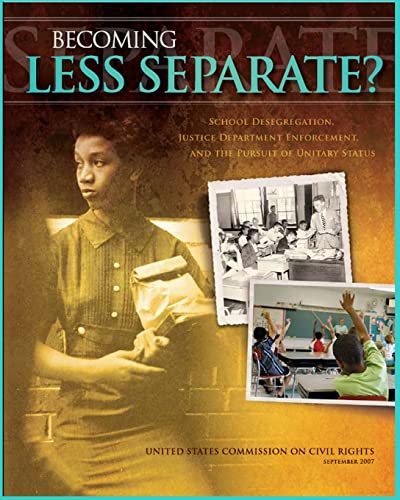The Fallout: Justice Department's School Desegregation Order And Its Impact On Education

Table of Contents
The Positive Impacts of School Desegregation Orders
The implementation of school desegregation orders, though often fraught with difficulties, yielded undeniable positive results for many students.
Increased Educational Opportunities for Minorities
Prior to desegregation, minority students, particularly African Americans, faced severely limited educational opportunities. They attended underfunded, overcrowded schools with inferior resources and often less qualified teachers. School desegregation orders, while imperfectly implemented, expanded access to better-funded schools and resources for previously underserved minority students.
- Improved teacher quality: Desegregation brought about better teacher training and a more diverse teaching staff in many districts.
- Access to advanced courses: Minority students gained access to advanced placement (AP) and International Baccalaureate (IB) courses, previously largely unavailable to them.
- Increased graduation rates: Improved resources and access to a broader curriculum contributed to increased high school graduation rates among minority students.
- Improved academic outcomes: Studies in several districts show measurable increases in standardized test scores and college enrollment rates for minority students following desegregation. This improved access translated into better career prospects and overall social mobility.
Promoting Racial Understanding and Integration
A key goal of school desegregation was to foster racial understanding and integration. Bringing students of different racial backgrounds together in the classroom was believed to break down stereotypes, promote empathy, and cultivate a more tolerant society.
- Fostering interracial friendships: Desegregation provided opportunities for children from diverse backgrounds to form friendships, fostering understanding and challenging ingrained prejudices.
- Breaking down stereotypes: Interacting with students of different races helped challenge preconceived notions and stereotypes about different groups.
- Promoting empathy: Exposure to diverse perspectives and experiences helped students develop empathy and understanding towards others. While the full realization of these social benefits was often hampered by ongoing societal racism and resistance to desegregation, the intent and, in many cases, the outcome, were positive steps towards a more integrated and inclusive society.
The Challenges and Negative Consequences of School Desegregation Orders
Despite the positive intentions and some demonstrable successes, the implementation of school desegregation orders was met with significant challenges and resulted in unforeseen negative consequences.
Resistance and Backlash
The transition to desegregated schools was not smooth. Widespread resistance, fueled by racism and prejudice, included legal battles, protests, and the phenomenon of "white flight." White families often moved to suburban districts or enrolled their children in private schools to avoid integration, significantly impacting the funding and resources of urban schools that became disproportionately minority.
- Creation of segregated private schools: The rise of private schools, often explicitly designed to exclude minority students, exacerbated segregation and educational inequalities.
- Funding inequalities: "White flight" drained resources from urban school districts, leaving them with fewer funds and resources to educate a predominantly minority student population.
- Continued residential segregation: Underlying residential segregation patterns often meant that even with desegregation orders, schools remained largely segregated due to neighborhood demographics.
- Gerrymandering and political maneuvers: Political manipulation, including gerrymandering, was often used to hinder desegregation efforts and maintain existing power structures.
Socioeconomic Disparities and Achievement Gaps
It's crucial to acknowledge that desegregation alone did not address underlying socioeconomic inequalities. Even after integration, achievement gaps between racial and ethnic groups persisted. The complex interplay of race, class, and educational outcomes remains a significant challenge.
- Poverty's impact on educational attainment: Poverty significantly impacts educational outcomes, regardless of school integration.
- Inadequate school resources in low-income areas: Even in desegregated schools, resource disparities often persisted, with schools in low-income areas receiving fewer funds and resources.
- Lack of equitable teacher training: Lack of adequate teacher training to address the needs of diverse student populations contributed to persistent achievement gaps.
The Long-Term Legacy and Ongoing Relevance of School Desegregation Orders
The legacy of the Justice Department's school desegregation orders continues to shape the American educational landscape.
The Continued Fight for Educational Equity
Despite decades of effort, the struggle for educational equity persists. Contemporary issues such as school funding disparities, disproportionate discipline rates for minority students, and persistent achievement gaps underscore the unfinished business of desegregation.
- Current court cases regarding school segregation: Legal battles continue to challenge de facto segregation and fight for equitable resource allocation.
- Ongoing efforts to diversify school faculty: Initiatives are underway to diversify the teaching force to better reflect the student population and provide more culturally relevant instruction.
- Initiatives to address achievement gaps: Numerous programs and interventions aim to address achievement gaps by providing targeted support for disadvantaged students.
Lessons Learned and Future Directions
The history of school desegregation offers valuable lessons for addressing contemporary educational inequities.
- Investing in early childhood education: High-quality early childhood education is crucial for closing achievement gaps before they widen.
- Providing targeted support for disadvantaged students: Targeted support programs are essential to address the unique needs of students facing socioeconomic challenges.
- Promoting culturally responsive teaching practices: Culturally responsive teaching that acknowledges and celebrates the diverse backgrounds of students is critical for effective instruction.
Conclusion:
The Justice Department's school desegregation orders have had a profound and complex impact on American education. While these orders brought about significant improvements in educational opportunities for minority students and, in some cases, fostered greater racial understanding, they also faced significant resistance and failed to fully address underlying socioeconomic inequalities. The legacy of these orders remains relevant today, highlighting the continued need for comprehensive approaches to achieve truly integrated and equitable schools for all children. Understanding the complexities of the Justice Department's school desegregation order and its continuing impact is crucial to advancing the fight for educational equity. Let's continue the conversation and work towards creating truly integrated and equitable schools for all children.

Featured Posts
-
 Impact Of Saturdays Storms On Tulsa Report Damage To Help The National Weather Service
May 03, 2025
Impact Of Saturdays Storms On Tulsa Report Damage To Help The National Weather Service
May 03, 2025 -
 Fbi Probes Millions In Losses From Executive Office365 Account Breaches
May 03, 2025
Fbi Probes Millions In Losses From Executive Office365 Account Breaches
May 03, 2025 -
 Joseph Tf 1 L Univers De La Creme De La Crim
May 03, 2025
Joseph Tf 1 L Univers De La Creme De La Crim
May 03, 2025 -
 Investigation Launched Into Mp Rupert Lowes Conduct
May 03, 2025
Investigation Launched Into Mp Rupert Lowes Conduct
May 03, 2025 -
 13 Kerja Sama Baru Hasil Pertemuan Presiden Erdogan Dan Indonesia
May 03, 2025
13 Kerja Sama Baru Hasil Pertemuan Presiden Erdogan Dan Indonesia
May 03, 2025
Latest Posts
-
 Expensive Offshore Wind Farms A Shift In Industry Favor
May 04, 2025
Expensive Offshore Wind Farms A Shift In Industry Favor
May 04, 2025 -
 The Ripple Effect Oil Supply Shocks And The Airline Industrys Future
May 04, 2025
The Ripple Effect Oil Supply Shocks And The Airline Industrys Future
May 04, 2025 -
 Oil Prices And Airline Profits A Direct Correlation In Times Of Crisis
May 04, 2025
Oil Prices And Airline Profits A Direct Correlation In Times Of Crisis
May 04, 2025 -
 Soaring Fuel Costs The Airline Industrys Response To Oil Supply Shocks
May 04, 2025
Soaring Fuel Costs The Airline Industrys Response To Oil Supply Shocks
May 04, 2025 -
 45 Vuelta Ciclista A La Region De Murcia El Suizo Christen Se Lleva El Triunfo
May 04, 2025
45 Vuelta Ciclista A La Region De Murcia El Suizo Christen Se Lleva El Triunfo
May 04, 2025
